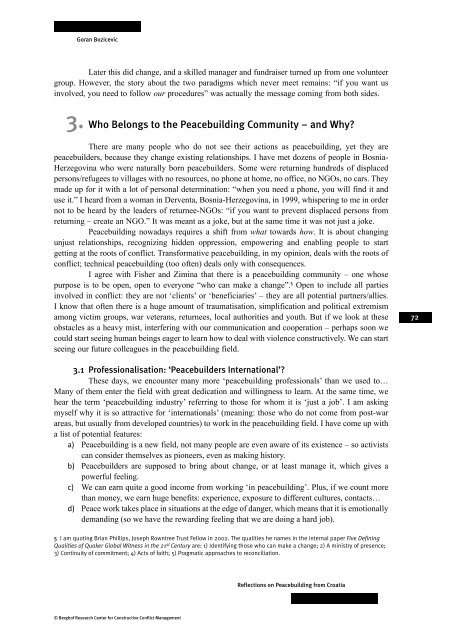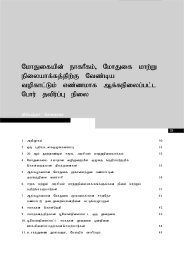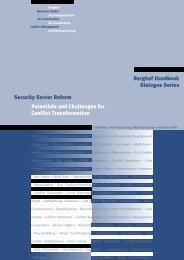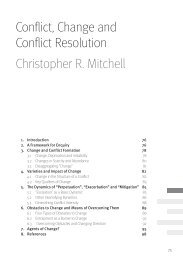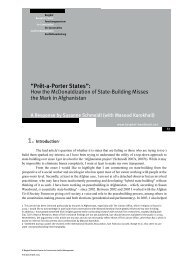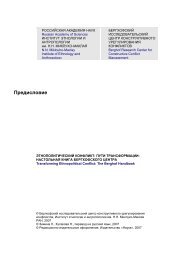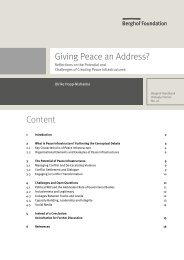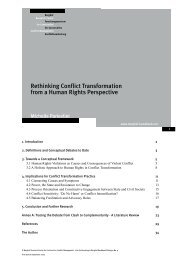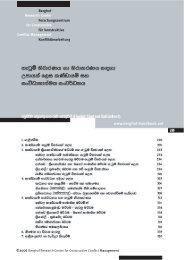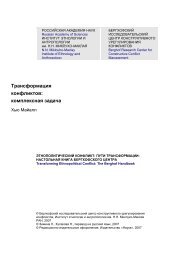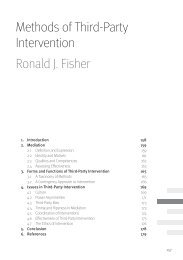Reflections on Peacebuilding from Croatia - Berghof Handbook for ...
Reflections on Peacebuilding from Croatia - Berghof Handbook for ...
Reflections on Peacebuilding from Croatia - Berghof Handbook for ...
You also want an ePaper? Increase the reach of your titles
YUMPU automatically turns print PDFs into web optimized ePapers that Google loves.
Goran Bozicevic<br />
Later this did change, and a skilled manager and fundraiser turned up <strong>from</strong> <strong>on</strong>e volunteer<br />
group. However, the story about the two paradigms which never meet remains: “if you want us<br />
involved, you need to follow our procedures” was actually the message coming <strong>from</strong> both sides.<br />
3. Who Bel<strong>on</strong>gs to the <strong>Peacebuilding</strong> Community – and Why?<br />
There are many people who do not see their acti<strong>on</strong>s as peacebuilding, yet they are<br />
peacebuilders, because they change existing relati<strong>on</strong>ships. I have met dozens of people in Bosnia-<br />
Herzegovina who were naturally born peacebuilders. Some were returning hundreds of displaced<br />
pers<strong>on</strong>s/refugees to villages with no resources, no ph<strong>on</strong>e at home, no office, no NGOs, no cars. They<br />
made up <strong>for</strong> it with a lot of pers<strong>on</strong>al determinati<strong>on</strong>: “when you need a ph<strong>on</strong>e, you will find it and<br />
use it.” I heard <strong>from</strong> a woman in Derventa, Bosnia-Herzegovina, in 1999, whispering to me in order<br />
not to be heard by the leaders of returnee-NGOs: “if you want to prevent displaced pers<strong>on</strong>s <strong>from</strong><br />
returning – create an NGO.” It was meant as a joke, but at the same time it was not just a joke.<br />
<strong>Peacebuilding</strong> nowadays requires a shift <strong>from</strong> what towards how. It is about changing<br />
unjust relati<strong>on</strong>ships, recognizing hidden oppressi<strong>on</strong>, empowering and enabling people to start<br />
getting at the roots of c<strong>on</strong>flict. Trans<strong>for</strong>mative peacebuilding, in my opini<strong>on</strong>, deals with the roots of<br />
c<strong>on</strong>flict; technical peacebuilding (too often) deals <strong>on</strong>ly with c<strong>on</strong>sequences.<br />
I agree with Fisher and Zimina that there is a peacebuilding community – <strong>on</strong>e whose<br />
purpose is to be open, open to every<strong>on</strong>e “who can make a change”. 5 Open to include all parties<br />
involved in c<strong>on</strong>flict: they are not ‘clients’ or ‘beneficiaries’ – they are all potential partners/allies.<br />
I know that often there is a huge amount of traumatisati<strong>on</strong>, simplificati<strong>on</strong> and political extremism<br />
am<strong>on</strong>g victim groups, war veterans, returnees, local authorities and youth. But if we look at these<br />
obstacles as a heavy mist, interfering with our communicati<strong>on</strong> and cooperati<strong>on</strong> – perhaps so<strong>on</strong> we<br />
could start seeing human beings eager to learn how to deal with violence c<strong>on</strong>structively. We can start<br />
seeing our future colleagues in the peacebuilding field.<br />
3.1 Professi<strong>on</strong>alisati<strong>on</strong>: ‘Peacebuilders Internati<strong>on</strong>al’?<br />
These days, we encounter many more ‘peacebuilding professi<strong>on</strong>als’ than we used to…<br />
Many of them enter the field with great dedicati<strong>on</strong> and willingness to learn. At the same time, we<br />
hear the term ‘peacebuilding industry’ referring to those <strong>for</strong> whom it is ‘just a job’. I am asking<br />
myself why it is so attractive <strong>for</strong> ‘internati<strong>on</strong>als’ (meaning: those who do not come <strong>from</strong> post-war<br />
areas, but usually <strong>from</strong> developed countries) to work in the peacebuilding field. I have come up with<br />
a list of potential features:<br />
a) <strong>Peacebuilding</strong> is a new field, not many people are even aware of its existence – so activists<br />
can c<strong>on</strong>sider themselves as pi<strong>on</strong>eers, even as making history.<br />
b) Peacebuilders are supposed to bring about change, or at least manage it, which gives a<br />
powerful feeling.<br />
c) We can earn quite a good income <strong>from</strong> working ‘in peacebuilding’. Plus, if we count more<br />
than m<strong>on</strong>ey, we earn huge benefits: experience, exposure to different cultures, c<strong>on</strong>tacts…<br />
d) Peace work takes place in situati<strong>on</strong>s at the edge of danger, which means that it is emoti<strong>on</strong>ally<br />
demanding (so we have the rewarding feeling that we are doing a hard job).<br />
5 I am quoting Brian Phillips, Joseph Rowntree Trust Fellow in 2002. The qualities he names in the internal paper Five Defining<br />
Qualities of Quaker Global Witness in the 21 st Century are: 1) Identifying those who can make a change; 2) A ministry of presence;<br />
3) C<strong>on</strong>tinuity of commitment; 4) Acts of faith; 5) Pragmatic approaches to rec<strong>on</strong>ciliati<strong>on</strong>.<br />
© <strong>Berghof</strong> Research Center <strong>for</strong> C<strong>on</strong>structive C<strong>on</strong>flict Management<br />
<str<strong>on</strong>g>Reflecti<strong>on</strong>s</str<strong>on</strong>g> <strong>on</strong> <strong>Peacebuilding</strong> <strong>from</strong> <strong>Croatia</strong><br />
72


